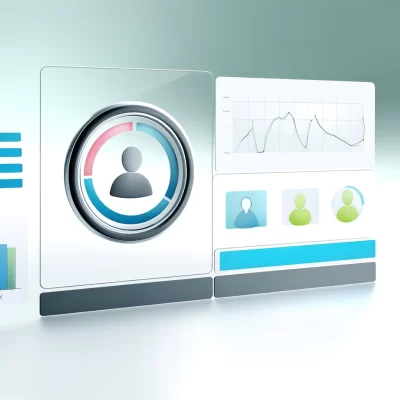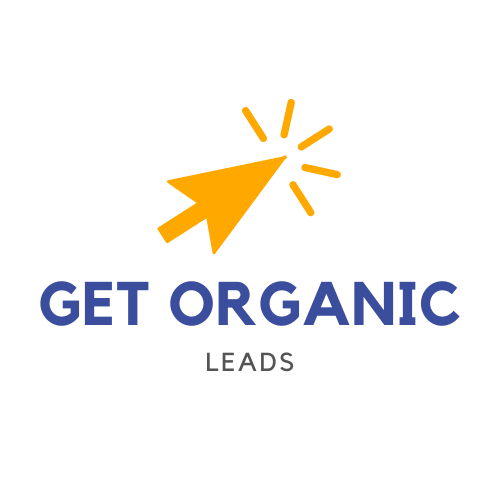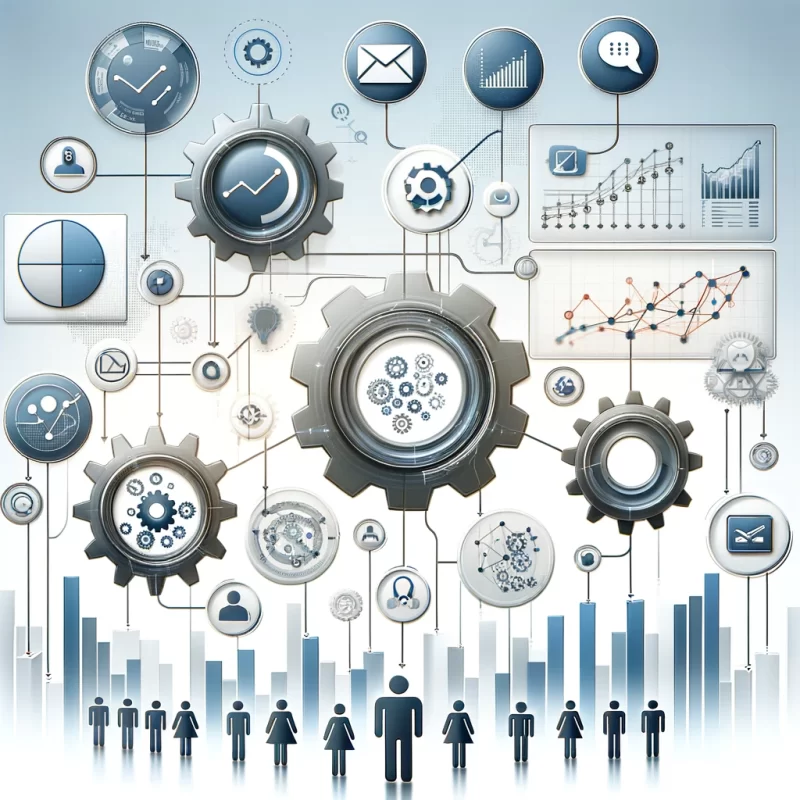- Introduction
- Email Marketing Automation
- Automated DM
- Social Media Scheduling
- Lead Scoring and Management
- Automated Customer Journeys
- CRM Integration
- Retargeting Campaigns
- Analytics and Reporting
- Dynamic Content Personalization
- AI-Powered Chatbots
Introduction
Today with technological advances and the numerous marketing tools available on the market, it is completely possible to automate your marketing strategies. In this article we will see 10 effective marketing strategies that can be completely automated.
![]()
Email Marketing Automation
Email marketing is a powerful strategie, but manually sending emails to each subscriber can be very long and tedious. Marketing automation platforms, such as Mailchimp, allow businesses to create automated email campaigns. These platforms can send welcome emails, nurture leads with targeted content, and re-engage inactive customers. Imagine a new subscriber joining your list and instantly receiving a warm welcome email, followed by a series of helpful resources tailored to their interests.
With this type of tool you no longer need to send emails one by one but just organize and prepare your email campaigns. These tools now offer a large number of features, templates and resources to improve the quality of your email marketing.
Automated DM
Sending DMs on social networks is a powerful way in marketing to find leads or grow your audience. It can take a long time to manually send each message to each person. Thanks to InstantFlow you can send personalized DMs automatically according to the target/audience you want to reach. This saves you time and gives you a constant flow of leads.
In this tool you also have the possibility of automatic follow up, which allows you to convert even more leads into customers, but also to sort your leads to only keep qualified leads.
Lead Scoring and Management
Not all leads are created equal, as you know if you want to convert your lead you need to have qualified lead. Marketing automation tools like Marketo and Pardot can score leads based on their behavior and engagement with your content. This helps sales teams prioritize high-quality leads, ensuring they focus their efforts on prospects most likely to convert.
Automated Customer Journeys
Mapping out a customer’s journey can be complex, but automation makes it manageable and more performant. Platforms like Salesforce (be cautious it’a an expensive tool, but powerful) and ActiveCampaign allow businesses to create automated workflows that guide customers through each stage of the buying process. These journeys can include personalized emails, targeted ads, and timely follow-ups, ensuring a seamless experience from awareness to purchase.
CRM Integration
Integrating marketing automation with CRM systems like HighLevel and Zoho CRM enhances the effectiveness of both tools. Automation can update CRM records in real-time, trigger actions based on customer behavior, and provide sales teams with valuable insights. Imagine a salesperson receiving an alert when a lead opens an email or downloads a whitepaper, allowing them to reach out at the perfect moment.
You can find all-in-one CRMs (HighLevel), which offer many other features (publications on social networks, email marketing), analyzes (Google analytics) etc. These all-in-one tools can be ideal for small and medium-sized businesses.

Retargeting Campaigns
Have you ever visited a website and then seen their ads everywhere you go online? That’s retargeting in action. Platforms like Google Ads and Meta Ads Manager enable businesses to create automated retargeting campaigns that keep their brand top-of-mind for potential customers. Retargeting has proven itself, it is very effective when placing paid advertisements.
Analytics and Reporting
Understanding the impact of your marketing efforts is crucial, you need to analyze the data to be able to measure the results (and make modifications).
Tools like HighLevel and HubSpot provide automated reporting that tracks campaign performance, customer behavior, and ROI. These insights help businesses make data-driven decisions, optimizing their strategies for better results. Your marketing becomes more and more adapted to your audience and brings you many more results.
Dynamic Content Personalization
Today consumers expect personalized experiences, and an intuitive website/interface. Marketing automation platforms like Adobe Campaign and Dynamic Yield allow businesses to deliver dynamic content that changes based on user behavior and preferences. Imagine a website that adapts its content to each visitor, offering products and recommendations tailored just for them. These tools can make recommendations to customers based on analysis of what they look at, click on, etc.
AI-Powered Chatbots
AI chatbots are revolutionizing customer service by providing instant, 24/7 support. Tools like Drift and Intercom use automation to answer common queries, guide users through processes, and even qualify leads. Picture a chatbot handling multiple customer inquiries simultaneously, providing quick solutions while your team focuses on more complex tasks. You can also add chatbots to all your communication channels (social media, SMS, messaging like WhatsApp).






Social Media Scheduling
Social networks are very powerful in marketing, but, consistency is key in social media marketing. Tools like Hootsuite and Buffer enable businesses to schedule posts across multiple platforms. You don’t have to go to every social network to publish your content but just plan your editorial calendar.
This ensures a steady stream of content, keeping audiences engaged without the daily task of manual posting. This not only saves you time, but also allows you to greatly improve the quality of your content by having a broader vision and being focused on creating quality content.